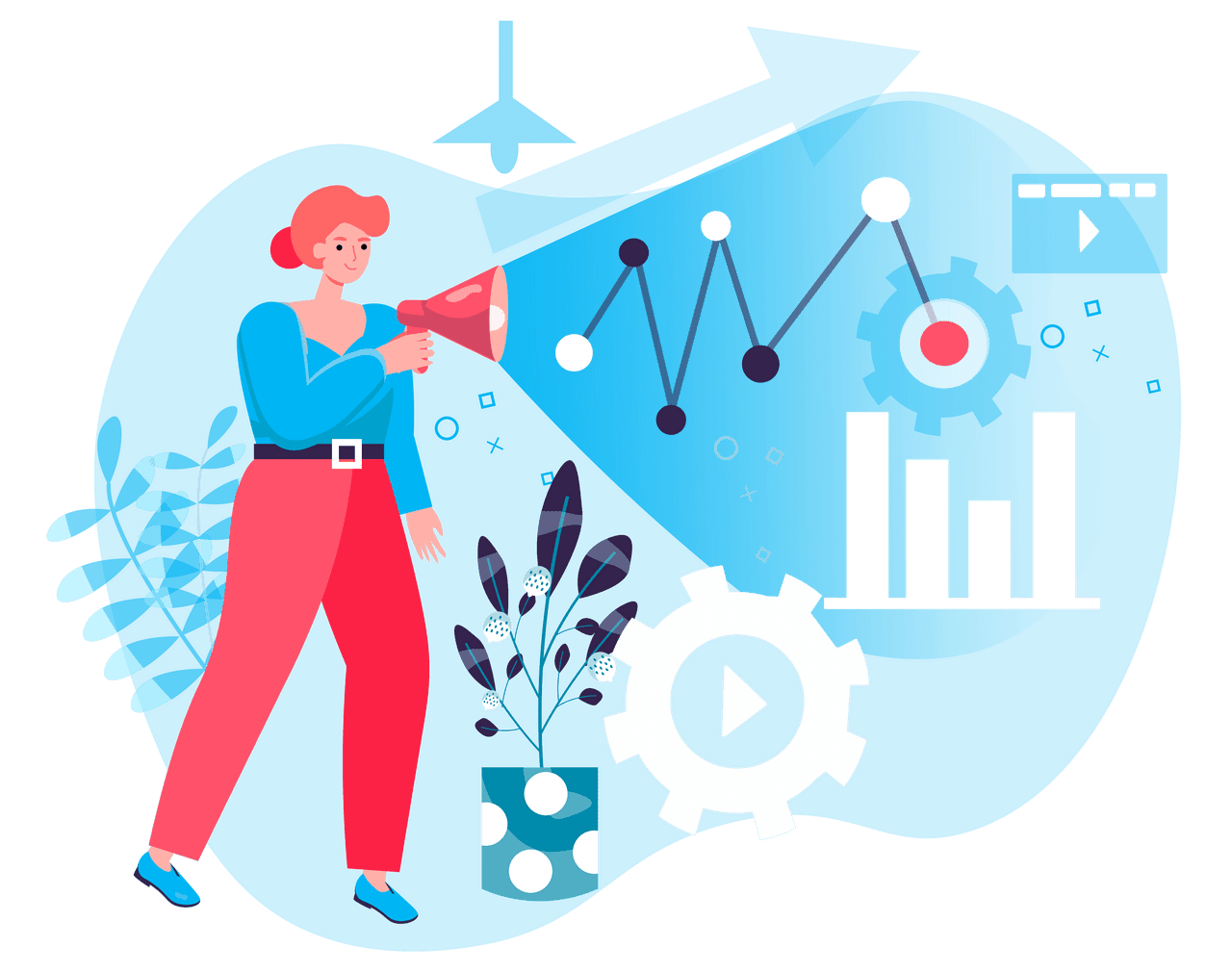
The global pandemic has forced us to fundamentally change our marketing strategies and business practices, possibly forever. This health crisis has hit companies of all sizes and changed our way of life and business and probably everyone will have to adapt in the long run. During the lockdown, many companies have struggled to adapt and survive in the industry. Those who have successfully endured the challenges may have realized new ways of reaching and reconnecting with their audience and customers. In this article, we’ll analyze how previous marketing and corporate research can help companies reduce risks and take advantage of the opportunities that COVID-19 brings.
Digital Marketing: Reevaluating Strategies and Channels
Digital Marketing: Reevaluating Strategies and Channels
The COVID 19 crisis has led to a number of changes for consumers and thus for the market. By examining the economic changes to which companies need to adapt and the impact on their business models, we can identify its negative impact on the economy and the resulting economic change in the global economy. Some of these changes are more temporary than others, while some are rapid adjustments that need to be made immediately, while others are likely to have been more sustainable in the medium term, and some are likely to be long-lasting.
In many ways, the COVID 19 crisis has driven developments that were essentially inevitable for a few years, but there is much to be learned about how companies should act when they fall into recession. Some of the changes require changes in their business models, to which almost all companies must adapt in some way. There are new problems and opportunities to be solved, with solutions that must be as digital as possible. Firstly, across all channels, devices, and media, companies must think about the technology that people will use and the goals they hope to achieve. Let’s explore the ways Covid-19 is changing the future of marketing.
SEO
SEO
SEO is more important than ever, as coronavirus has emerged and consumer behavior has changed. SEO and paid search are some of the most effective strategies businesses can use during the pandemic. The crisis has changed consumer behavior in many ways, and in many other countries around the world.
Search engine optimization is important because it is essentially free web traffic with a relatively low initial investment. Unlike people who are in a hurry to find little things, most consumers prefer to search online rather than browse the available options in person. These include things like health insurance, healthcare, and medical equipment, but also more expensive products and services than they would have if they had to shop quickly.
Unfortunately, many companies will fall victim to the pandemic, and innovative businesses will emerge and more customers will turn to online sources before making a decision of going to the brick and mortar store. When they do, they’ll look for a particular product or service and want to be certain that they are available and that they are convenient to get online before venturing out into the public.

Digital Advertising and Spending
Digital Advertising and Spending
Advertising spending needs to adapt to changing consumer spending habits. When the global advertising industry was launched, the gap between advertising spending and customer spending in the US and the rest of the world shrank. As consumer behavior changes and the transition to the digital world remains a vague concept for most businesses, marketers need to focus more on getting the right message across the right channels. Post - covid, there is much more focus on digital marketing than in the past, especially in terms of digital advertising.
Overall, the marketing activities of companies have generally had a positive impact on the long-term health of their business models. In general, we also find that companies benefit from maintaining or even increasing their advertising budgets compared to pre-recession. Those who manage to do well during a recession will generally maintain their improved position once the recessions are over. Businesses need to get a better understanding of their customers. So the question will be: how should we spend our budgets to ensure that we can survive the crisis and even increase our market share?
While most customers will not suffer a major loss of income, the possibility that this could still occur can affect the way they spend their money, even if they do not suffer a major drop in income. Over time, customers can experience the psychological impact, which can have a negative impact on the way companies should promote their products and services. By taking these new emotions into account, you can provide security to your customers by giving them the opportunity to change their minds for a longer period of time after the purchase. One effective method is to take on the role of an expert who helps your clients make decisions by being more credible.
Online Presence
Online Presence
When customers experience uncertainty and are willing to challenge existing purchasing habits and partnerships, these decisions have the potential to increase or decrease market share and profitability. Stronger firms gain market share, and weaker firms tend to fail, according to our analysis of the impact of marketing activities on the long-term health of companies. The way people shop today is very different from the way it used to be, with much more online shopping and less physical shopping in general. Having a strong online presence has an immediate competitive advantage over its competitors in terms of customer experience.
Today, however, it is crucial that companies have control over all things marketing-related. This is particularly true for the companies most affected by Covid-19, such as Amazon, Google, Facebook, Apple, Microsoft, Netflix, and others.

Social Media Marketing
Social Media Marketing
Social distancing has given paid and organic social media marketing a boost. Many people now rely on social media to socialize, and are now active on various social media platforms, including Facebook, Twitter, Instagram, LinkedIn, Pinterest, YouTube, Google, and Others, all of which are seeing massive increases in usage.
Digital Activities and Events
Digital Activities and Events
The outbreak of the coronavirus has seen an increase in digital events, but virtual events will remain the most popular form of digital marketing due to their low cost and high quality of service.
These tools can provide added value to your customers even in times of frozen budgets. This is a great strategy when your audience cannot buy because of a frozen budget. This tactic, in relation to the value of the building, is likely to continue in a post-pandemic marketplace. Marketers can use tools like attending webinars to help them stay resilient during a pandemic.
Video Marketing
Video Marketing
The Video Marketing space will continue to provide businesses with opportunities to create high-quality, informative videos that reach their audiences. The coronavirus has forced marketers to find innovative ways to do more with less. YouTube and other similar outlets have seen a boost in usage, and even after Covid, more people are choosing videos than other types of content. With YouTube and Tiktok in the lead for entertainment and information, video content has increasingly become popular and has shown to hold better engagement than any other type of content.

With everybody pumping in all they have on the web, the content available is extremely saturated that people’s attention has gotten significantly shorter and more valuable. Providing content that gets noticed isn’t as easy as it used to be, especially without a strategy. Technological advances have spoiled us and we constantly want something quick and easy to digest. Videos show more movement than photos and increase the chances of getting your audience to watch and evaluate your offer and whether it matches their interest. It is definitely the time to reassess your content strategy and use videos to deliver your message and brand to the world effectively.
Customer Relationships
Customer Relationships
The pandemic has also led to an increase in the importance of establishing and maintaining strong customer relationships and the need for better customer loyalty. This sense of community will lead more and more consumers to want to know that their money is going to companies doing the right thing worldwide. In addition, the focus is more on corporate culture, mission, and vision, and marketers are looking for ways to communicate more efficiently and effectively with their audience. As rules, regulations, operations, and business processes have shifted, so has consumers’ behavior.
They have adapted to the changes forced upon by the COVID 19 and the lockdown has definitely influenced new perspectives that have altered people’s priorities and interests. Some due to the fear of the next pandemic, and some due to the financial limitations caused by the economic downfall. The pandemic has stripped off companies with some power and revealed some weaknesses which made most of us reevaluate different brands and businesses on how they stayed reliable in providing support and meeting our needs. This inevitably made consumers reassess the way they respond and reach these companies. It is therefore important for businesses to constantly monitor these behavioral shifts and identify new problems and gaps they can use in order to establish lifelong success.
Digital Tools
Digital Tools
As far as learning the truth about products and services, marketers must be efficient. The technique of accomplishing more with fewer resources will continue as marketers look for more ways to attract a wider audience. We need to look for technological solutions to consolidate less and move faster, and we need to free up marketing resources to re-apply them.
The Acceleration to the Digital: What This Means for Analog and Traditional Marketing
The Acceleration to the Digital: What This Means for Analog and Traditional Marketing
With most companies already immersed with technology during pre-Covid, the pandemic has pulled them into a full transformation to digital. To their benefit, this has helped them emerge victorious during these times compared to the vast majority who were not as agile and prepared. But does this mean we are finally putting traditional marketing to the grave? Or does traditional marketing still hold some value we could revisit and invest in? While the benefits of digital over analog in terms of cost, efficiency, and reach have long been proven to outperform traditional means, these times showed going digital as an effective coping mechanism for the pandemic.
Social distancing may have depleted traditional marketing, singling out digital as the only option. As we go through the economy’s reopening with new rules and regulations, people’s behavior after coronavirus may be here to stay and may not change for a while. They know now that this can happen at any time. Moreover, the media provides insufficient information regarding the situation and how to prepare for the future better. We may, however, eventually still seek to become digitally fatigued or analog-nostalgic but for now, it’s go digital and stay home!
Digital Transformation: Vital Tactics for Every Company’s Survival
Digital Transformation: Vital Tactics for Every Company’s Survival
As previously mentioned, most companies have fully transitioned to automation and digitizing business processes, and it may be for the better. This was always the future envisioned and coronavirus may have only paced up how things were ultimately going to end up. There are too many advantages mentioned with digitization and we know that technology is bound to change at an increasing pace.

With more and more people online, ensuring online visibility through effective marketing can be the recipe for success and business resilience. Applying all learnings from today’s situation is a wise strategy. The best way for businesses to move forward is to note down strategies that worked, as well as save audiences who were more responsive during these times. It is vital for companies to do as much as they can to stay agile and adapt quickly to changes in technology and trends.
Although we need to come up with better marketing strategies, whether we market to the individual customer or large companies, the primary goals remain the same, which is to attract more people and turn them into paying customers. We want to reach the right market with the right messages, and at the right times.
If we don't try to understand how marketing is changing and what that means for marketers, we will have a hard time succeeding. So how do you make your short and long-term goals adapt to new conditions so you get the best out of your marketing after COVID-19? Consider the benefits of strategy consulting as we can help you rebuild your brand and strategy to stand against any future crises. Contact us for more information on how strategy consulting can help your business today.

